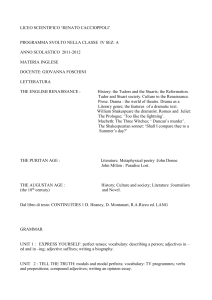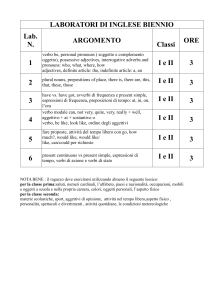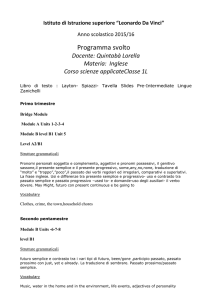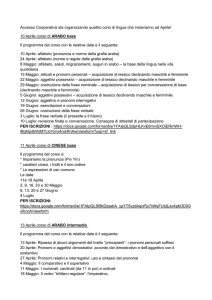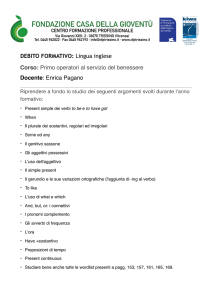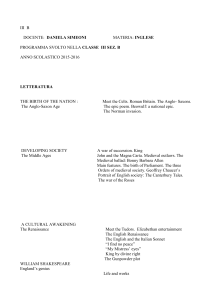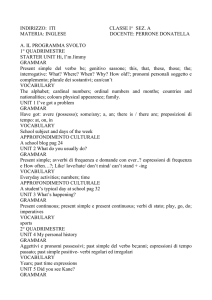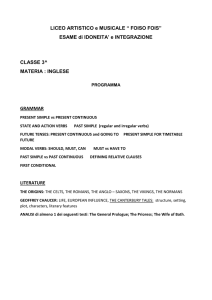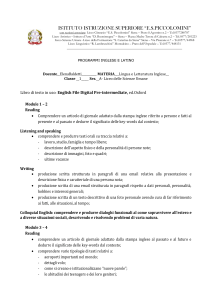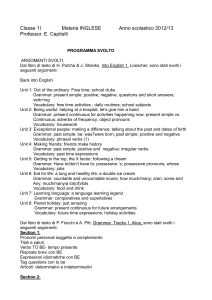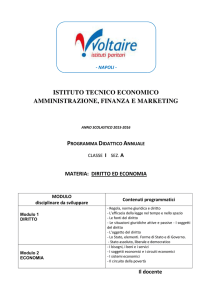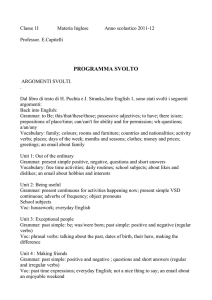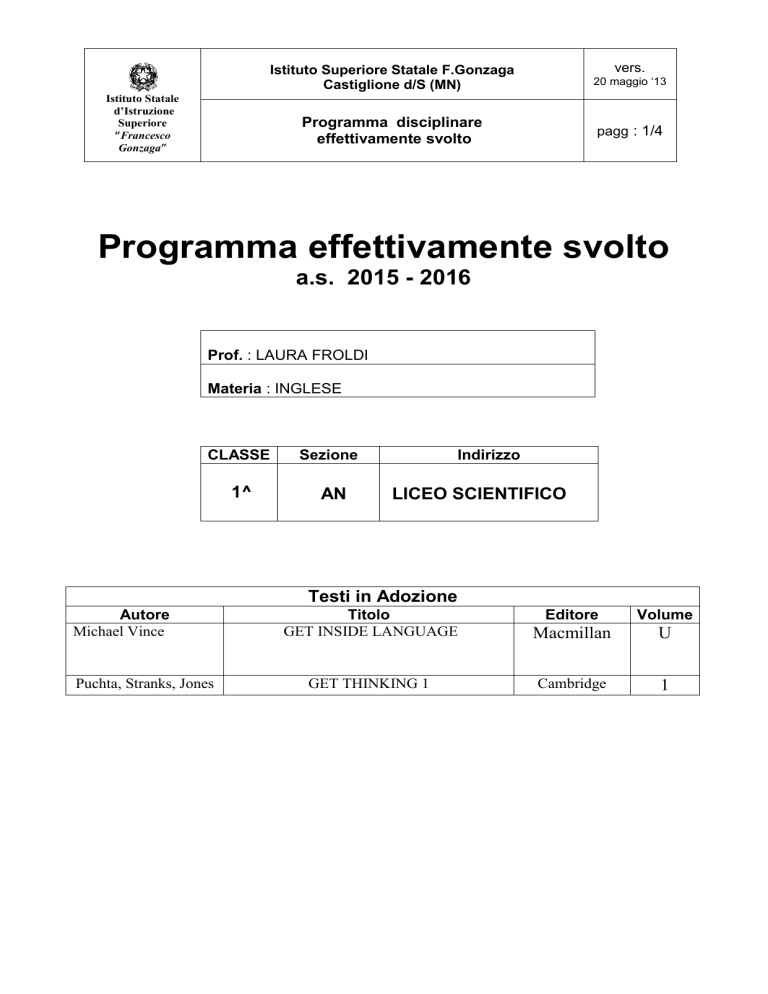
vers.
Istituto Superiore Statale F.Gonzaga
Castiglione d/S (MN)
20 maggio ‘13
Programma disciplinare
effettivamente svolto
pagg : 1/4
Istituto Statale
d’Istruzione
Superiore
“Francesco
Gonzaga”
Programma effettivamente svolto
a.s. 2015 - 2016
Prof. : LAURA FROLDI
Materia : INGLESE
CLASSE
1^
Sezione
AN
Indirizzo
LICEO SCIENTIFICO
Testi in Adozione
Autore
Michael Vince
Puchta, Stranks, Jones
Titolo
GET INSIDE LANGUAGE
Editore
Volume
Macmillan
U
GET THINKING 1
Cambridge
1
Moduli sviluppati
con indicazioni bibliografiche
Modulo
WELCOME
USEFUL
THINGS
HAVING FUN
MONEY
FOOD
FAMILY
HOUSE
FRIENDS
THE WORLD
PLACES IN
TOWN
BODY
GRAMMAR:
Argomenti
REVISION:
GRAMMAR: to be; imperatives; can; subject
and object pronouns; this/that/these/those;
VOCABULARY: countries and nationality;
classroom objects; prepositions of place;
numbers; days and dates; time
FUNCTIONS: personal information; classroom
language
GRAMMAR: have got; there is/there are; plural
nouns; possessive ‘s; possessive adjectives;
a/an; some/any; present simple; adverbs of
frequency; like + -ing;
VOCABULARY: everyday objects; adjectives;
hobbies and free time activities; prepositions of
time;
FUNCTIONS: describing objects; agreeing and
disagreeing
GRAMMAR: present continuous; present
simple vs. present continuous; verbs of
perception and state verbs; countable and
uncountable nouns; much/many/a lot of/lots of;
too many/too much/(not) enough
VOCABULARY: money and prices; shops;
clothes; food and drink; adjectives to talk about
food;
FUNCTIONS: buying things; ordering food
GRAMMAR: possessive adjectives and
pronouns; whose and possessive ‘s; infinitive of
purpose; past simple be and regular verbs;
modifiers: quite, very, really;
VOCABULARY: family members; feelings;
parts of the house; furniture; -ed and -ing
adjectives;
FUNCTIONS: asking for permission; expressing
emotion
GRAMMAR: past simple irregular verbs;
double genitive; comparative adjectives;
superlative adjectives; can (ability);
VOCABULARY: character adjectives; friends
and friendship; past time expressions; animals;
geographical features; the weather;
FUNCTIONS: talking about past events; talking
about ability
GRAMMAR: be going to (intentions); present
continuous (arrangements); adverbs of manner;
will/won’t (future predictions, offers and
spontaneous decisions); first conditional;
VOCABULARY: places and things in town;
parts of the body; health problems; when/if/as
soon as;
FUNCTIONS: inviting and making
arrangements; making predictions;
Exclamations, here it is/ here +is+noun,
Letture
testo in
adozione
Altri strumenti
multimediali o
bibliografici
Tutte
(ad eccezione di
pag 66-67)
2
SOMETHING
MORE
Adjectives ending in -ed /-ing, infinito di scopo,
present continuous per le lamentele,
interrogative adjectives and pronouns, so do I
/neither do I, reggenze del verbo: to/ -ing /-X , il
verbo sostantivato, uso di “ancora” still/ yet/
some more, come esprimere le misure (
domande e rispote), let’s ( esortazione), stative
verbs, uso di hundreds/thousands, question tags,
costruzione dei verbi di volontà ( I want
someone to do) uso di both …and, neither…nor,
to get+adjective, costruzioni di get/make/let/
(fare), doppio accusativo, uso di a little, a few,
verbi: to look/to sound/to smell/to taste; to
play/togo+ing/ to do +sports; to borrow/to lend/
verbi di preferenza+ing, should per dare
consigli, come esprimere l’età (...-years-old+
noun; in one’s early/mid/late+ decina), phrasal
verbs e idioms analizzati in classe.
Castiglione delle Stiviere, 8 giugno 2016
Il docente
Laura Froldi
______________________
( firma)
3

